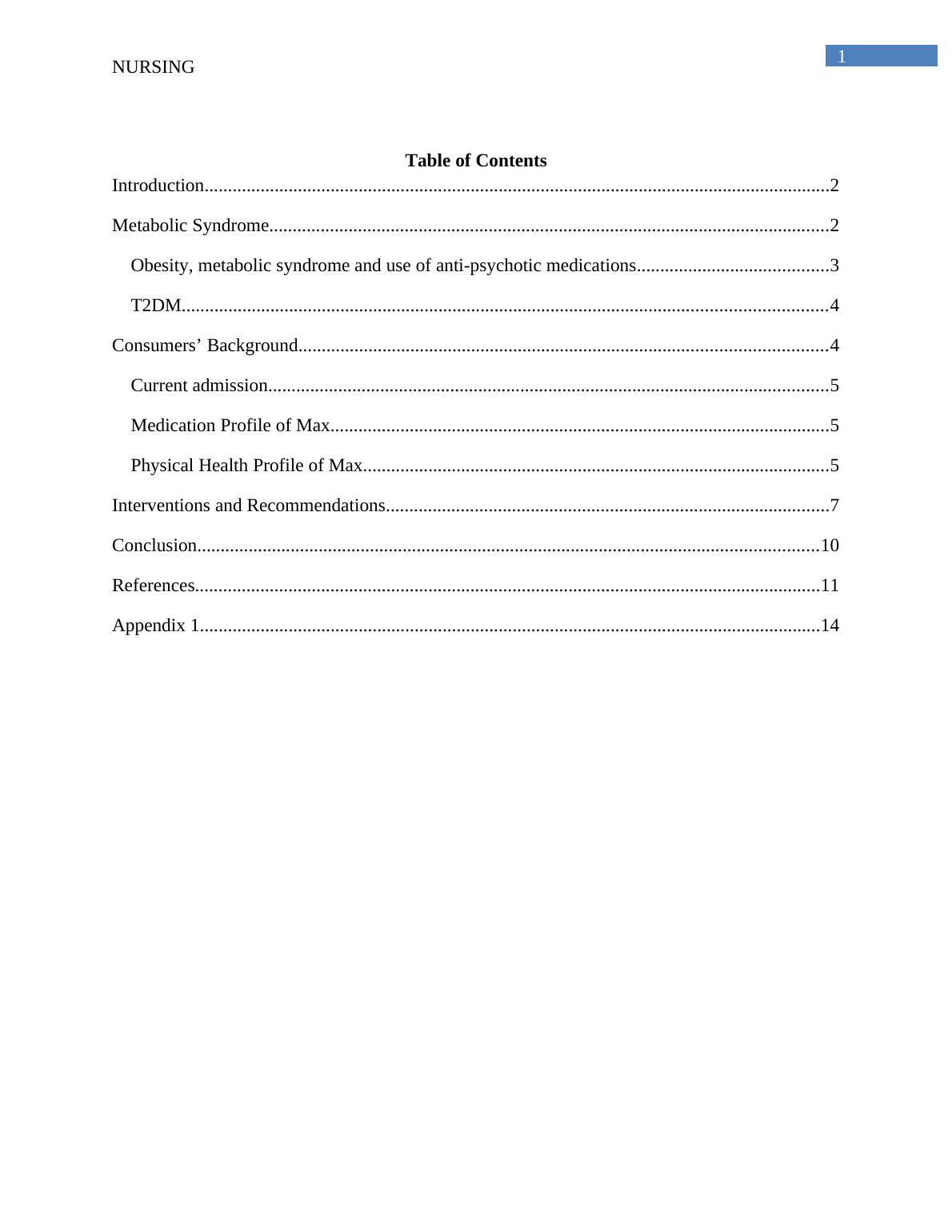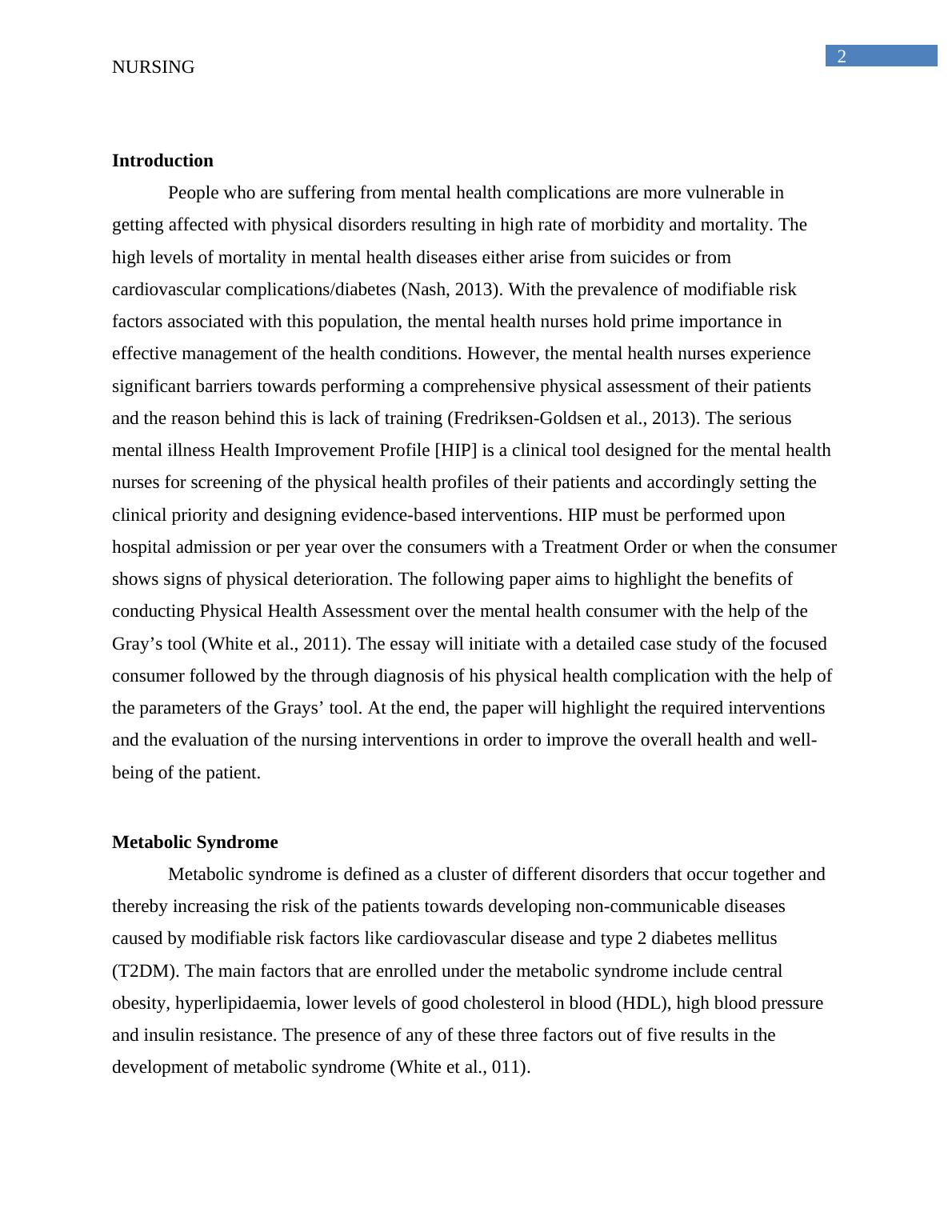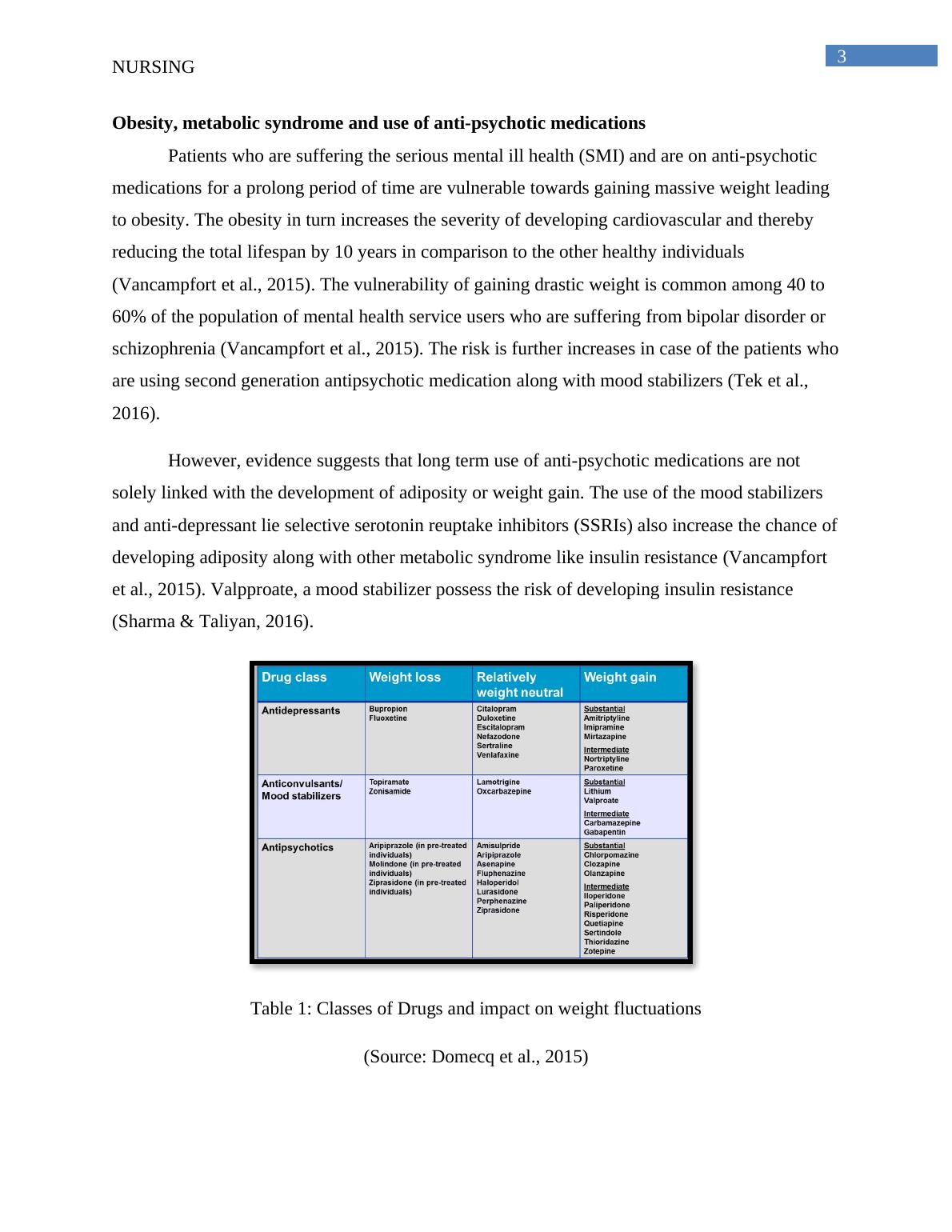Physical Health Assessment of Mental Health Consumers: A Case Study of Max
Added on 2023-06-10
16 Pages4598 Words483 Views
Running head: NURSING
Nursing
Name of the Student
Name of University
Author’s note
Nursing
Name of the Student
Name of University
Author’s note

1
NURSING
Table of Contents
Introduction......................................................................................................................................2
Metabolic Syndrome........................................................................................................................2
Obesity, metabolic syndrome and use of anti-psychotic medications.........................................3
T2DM..........................................................................................................................................4
Consumers’ Background.................................................................................................................4
Current admission........................................................................................................................5
Medication Profile of Max...........................................................................................................5
Physical Health Profile of Max....................................................................................................5
Interventions and Recommendations...............................................................................................7
Conclusion.....................................................................................................................................10
References......................................................................................................................................11
Appendix 1.....................................................................................................................................14
NURSING
Table of Contents
Introduction......................................................................................................................................2
Metabolic Syndrome........................................................................................................................2
Obesity, metabolic syndrome and use of anti-psychotic medications.........................................3
T2DM..........................................................................................................................................4
Consumers’ Background.................................................................................................................4
Current admission........................................................................................................................5
Medication Profile of Max...........................................................................................................5
Physical Health Profile of Max....................................................................................................5
Interventions and Recommendations...............................................................................................7
Conclusion.....................................................................................................................................10
References......................................................................................................................................11
Appendix 1.....................................................................................................................................14

2
NURSING
Introduction
People who are suffering from mental health complications are more vulnerable in
getting affected with physical disorders resulting in high rate of morbidity and mortality. The
high levels of mortality in mental health diseases either arise from suicides or from
cardiovascular complications/diabetes (Nash, 2013). With the prevalence of modifiable risk
factors associated with this population, the mental health nurses hold prime importance in
effective management of the health conditions. However, the mental health nurses experience
significant barriers towards performing a comprehensive physical assessment of their patients
and the reason behind this is lack of training (Fredriksen-Goldsen et al., 2013). The serious
mental illness Health Improvement Profile [HIP] is a clinical tool designed for the mental health
nurses for screening of the physical health profiles of their patients and accordingly setting the
clinical priority and designing evidence-based interventions. HIP must be performed upon
hospital admission or per year over the consumers with a Treatment Order or when the consumer
shows signs of physical deterioration. The following paper aims to highlight the benefits of
conducting Physical Health Assessment over the mental health consumer with the help of the
Gray’s tool (White et al., 2011). The essay will initiate with a detailed case study of the focused
consumer followed by the through diagnosis of his physical health complication with the help of
the parameters of the Grays’ tool. At the end, the paper will highlight the required interventions
and the evaluation of the nursing interventions in order to improve the overall health and well-
being of the patient.
Metabolic Syndrome
Metabolic syndrome is defined as a cluster of different disorders that occur together and
thereby increasing the risk of the patients towards developing non-communicable diseases
caused by modifiable risk factors like cardiovascular disease and type 2 diabetes mellitus
(T2DM). The main factors that are enrolled under the metabolic syndrome include central
obesity, hyperlipidaemia, lower levels of good cholesterol in blood (HDL), high blood pressure
and insulin resistance. The presence of any of these three factors out of five results in the
development of metabolic syndrome (White et al., 011).
NURSING
Introduction
People who are suffering from mental health complications are more vulnerable in
getting affected with physical disorders resulting in high rate of morbidity and mortality. The
high levels of mortality in mental health diseases either arise from suicides or from
cardiovascular complications/diabetes (Nash, 2013). With the prevalence of modifiable risk
factors associated with this population, the mental health nurses hold prime importance in
effective management of the health conditions. However, the mental health nurses experience
significant barriers towards performing a comprehensive physical assessment of their patients
and the reason behind this is lack of training (Fredriksen-Goldsen et al., 2013). The serious
mental illness Health Improvement Profile [HIP] is a clinical tool designed for the mental health
nurses for screening of the physical health profiles of their patients and accordingly setting the
clinical priority and designing evidence-based interventions. HIP must be performed upon
hospital admission or per year over the consumers with a Treatment Order or when the consumer
shows signs of physical deterioration. The following paper aims to highlight the benefits of
conducting Physical Health Assessment over the mental health consumer with the help of the
Gray’s tool (White et al., 2011). The essay will initiate with a detailed case study of the focused
consumer followed by the through diagnosis of his physical health complication with the help of
the parameters of the Grays’ tool. At the end, the paper will highlight the required interventions
and the evaluation of the nursing interventions in order to improve the overall health and well-
being of the patient.
Metabolic Syndrome
Metabolic syndrome is defined as a cluster of different disorders that occur together and
thereby increasing the risk of the patients towards developing non-communicable diseases
caused by modifiable risk factors like cardiovascular disease and type 2 diabetes mellitus
(T2DM). The main factors that are enrolled under the metabolic syndrome include central
obesity, hyperlipidaemia, lower levels of good cholesterol in blood (HDL), high blood pressure
and insulin resistance. The presence of any of these three factors out of five results in the
development of metabolic syndrome (White et al., 011).

3
NURSING
Obesity, metabolic syndrome and use of anti-psychotic medications
Patients who are suffering the serious mental ill health (SMI) and are on anti-psychotic
medications for a prolong period of time are vulnerable towards gaining massive weight leading
to obesity. The obesity in turn increases the severity of developing cardiovascular and thereby
reducing the total lifespan by 10 years in comparison to the other healthy individuals
(Vancampfort et al., 2015). The vulnerability of gaining drastic weight is common among 40 to
60% of the population of mental health service users who are suffering from bipolar disorder or
schizophrenia (Vancampfort et al., 2015). The risk is further increases in case of the patients who
are using second generation antipsychotic medication along with mood stabilizers (Tek et al.,
2016).
However, evidence suggests that long term use of anti-psychotic medications are not
solely linked with the development of adiposity or weight gain. The use of the mood stabilizers
and anti-depressant lie selective serotonin reuptake inhibitors (SSRIs) also increase the chance of
developing adiposity along with other metabolic syndrome like insulin resistance (Vancampfort
et al., 2015). Valpproate, a mood stabilizer possess the risk of developing insulin resistance
(Sharma & Taliyan, 2016).
Table 1: Classes of Drugs and impact on weight fluctuations
(Source: Domecq et al., 2015)
NURSING
Obesity, metabolic syndrome and use of anti-psychotic medications
Patients who are suffering the serious mental ill health (SMI) and are on anti-psychotic
medications for a prolong period of time are vulnerable towards gaining massive weight leading
to obesity. The obesity in turn increases the severity of developing cardiovascular and thereby
reducing the total lifespan by 10 years in comparison to the other healthy individuals
(Vancampfort et al., 2015). The vulnerability of gaining drastic weight is common among 40 to
60% of the population of mental health service users who are suffering from bipolar disorder or
schizophrenia (Vancampfort et al., 2015). The risk is further increases in case of the patients who
are using second generation antipsychotic medication along with mood stabilizers (Tek et al.,
2016).
However, evidence suggests that long term use of anti-psychotic medications are not
solely linked with the development of adiposity or weight gain. The use of the mood stabilizers
and anti-depressant lie selective serotonin reuptake inhibitors (SSRIs) also increase the chance of
developing adiposity along with other metabolic syndrome like insulin resistance (Vancampfort
et al., 2015). Valpproate, a mood stabilizer possess the risk of developing insulin resistance
(Sharma & Taliyan, 2016).
Table 1: Classes of Drugs and impact on weight fluctuations
(Source: Domecq et al., 2015)

End of preview
Want to access all the pages? Upload your documents or become a member.
Related Documents
Promoting Self-Management Skills for Type 2 Diabetes Mellitus in Older Adultslg...
|13
|3516
|370
Cardiovascular Disease in Older Adults with Dementia and Antipsychotic Medication Uselg...
|12
|3455
|474
Diseas Process and Management Assessment 2022lg...
|4
|581
|12
Installation of Exercise Equipment in Acute Mental Wardlg...
|12
|2968
|286
Increased Self-Care Activities and Glycemic Control Rate in Relation to Health Education via Wechat Among Diabetes Patients: A Randomized Clinical Triallg...
|12
|3843
|20
Desklib - Online Library for Study Material with Solved Assignmentslg...
|6
|1147
|372
